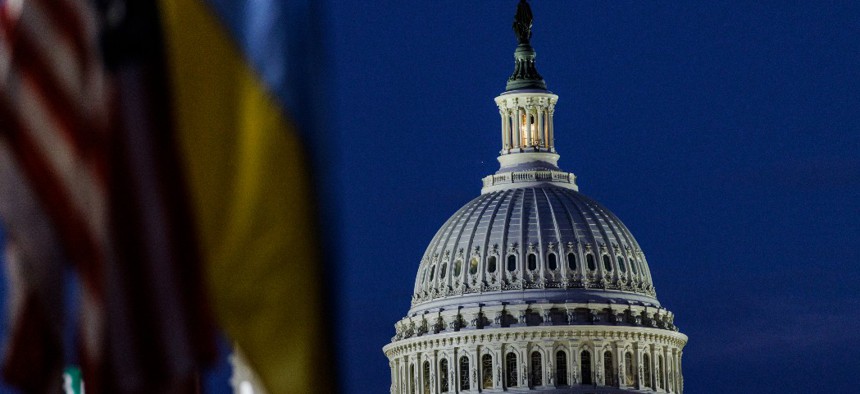Lawmakers Advance Tech Security Bills Amid Heightened International Tensions

Samuel Corum/Getty Images
Several pieces of legislation emphasizing new technology policy are headed to the House floor.
The House Homeland Security Committee approved a flurry of new bills this week, two of which regulate the use of emerging technologies and social media.
One bars the use of TikTok by full time employees and contractors at the Department of Homeland Security on government-owned devices, the latest in a pattern of legislation restricting federal employees’ and lawmakers’ usage of the app.
The No TikTok on Department of Homeland Security Devices Act specifically prohibits downloading or using TikTok on agency-issued devices. The bill targets TikTok’s parent company, ByteDance, and attempts to mitigate data collection that threatens national security.
The bill was introduced by Rep. Michael Guest, R-Miss., on February 28. Guest cited renewed national security concerns as Russia began its military attack against Ukraine.
“In today’s world, we cannot risk compromising important homeland security information to our foreign adversaries,” Guest said. “Russia’s invasion of Ukraine could embolden the CCP’s own expansionary goals. In such a scenario, a security breach would be catastrophic to a U.S. response.”
On the same day, the Securing the Checkpoint Property Screening System bill also cleared the committee. Proposed by Rep. John Katko, R-NY, the pending legislation allocates funding to the Transportation Security Administration for the replacement of X-ray screening equipment, as well as additional funding for research and development.
$1,641,400,000 would be allocated to the TSA for the X-ray updates, to be distributed over the course of five years. Another $82,077,000 in federal funding would be dedicated to research into technologies like detection, safety, cybersecurity, interoperability, availability and throughput.
“It’s imperative that TSA quickly replace its outdated x-ray screening at airports with the advanced detection capability that computed tomography technology provides,” said Katko. “At current funding levels, TSA won’t fully deploy CT technology to all checkpoints nationwide for another 10 to 15 years, which is completely unacceptable based on the current threat environment. My bill authorizes full funding for the CT program to send a strong message that it is long past time for the executive branch and Congress to fully support this critical security technology.”
Both bills passed the committee on Wednesday, and are headed to the House floor.






